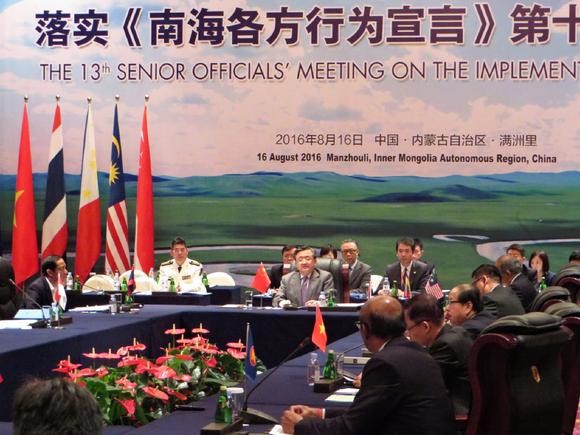
- Reuters reports: "China and a grouping of Southeast Asian nations aim to finish by the middle of next year a framework for a code of conduct to ease tension in the disputed South China Sea, state media said on Wednesday....Meeting in northeastern China, the two sides agreed to get the framework for the code of conduct done by mid-2017, and also approved guidelines for a China-ASEAN hotline for use during maritime emergencies, the official China Daily said. They also agreed that a pact on unplanned maritime encounters, signed in 2014 by countries in the region, applied to the South China Sea, the newspaper added. Chinese Vice Foreign Minister Liu Zhenmin said documents on the hotline and unplanned encounters would be presented for final approval to leaders in Laos next month at a meeting between China and ASEAN members, the paper said."
The Washington Post comments: "China's Olympic team has significantly underperformed in Rio, slipping behind Great Britain into third place with just 17 golds at the end of Day 11. It is shaping up to be China's worst Olympic performance since 1996. For a government that has long sought to bolster its prestige with Olympic success, that presents something of a challenge. State media, which began the Games in a buoyant mood, has spent the last week desperately downgrading expectations....China has long been known for a single-minded obsession with Olympic gold. Potential athletes are picked out at a young age and ruthlessly groomed for Olympic success, often in a sport of the authorities' choice. Nothing but first place was good enough for the media or the public, and Olympic success was seen as a potent symbol of a nation's rise — culminating of course in the grand spectacle of Beijing's 2008 Olympic Games, where it won a record 51 golds."
The New York Times reports: "For most of its 25 years, the Chinese history magazine Yanhuang Chunqiu has been loved by moderate liberals and detested with equal passion by devotees of Mao Zedong, who reviled it as a refuge for heretical criticisms of the Chinese leader and the Communist Party. But in a sign of how sharply ideological winds have turned under President Xi Jinping, officials who recently took control of the magazine have wooed Maoist and nationalist writers who long scorned the magazine. Several well-known hard-line polemicists attended a meeting with the new managers on Monday. The new masters of Yanhuang Chunqiu, which had been one of the few remaining outlets for liberal political opinion in China, appear likely to remake it into an avidly loyal defender of party orthodoxy, said Wu Wei, who has remained in place as executive editor of the magazine but is among those fighting to save its independence."
- 2016-08-16 UK’s May reassures China after nuclear power plant delay
- 2016-08-15 China says no South China Sea at G-20, US urges transparency
- 2016-08-14 China to use tougher environmental standards to tackle capacity glut
- 2016-08-12 How the China Shock, Deep and Swift, Spurred the Rise of Trump
- 2016-08-11 Here’s how the South China Sea ruling affects U.S. interests
- 2016-08-10 Exclusive: Vietnam moves new rocket launchers into disputed South China Sea - sources
- 2016-08-09 China’s Limited Retaliation Options Against the THAAD Deployment in South Korea
- 2016-08-08 The Rio Olympics are really hurting China’s feelings
- 2016-08-05 Meet the China ‘whisperers’ who get the big deals done in Silicon Valley
- 2016-08-03 China, Not Silicon Valley, Is Cutting Edge in Mobile Tech
- Reuters China, ASEAN aim to complete framework of South China Sea rules next year
- The Wall Street Journal Myanmar Leader to Discuss Contested Dam Project on China Visit
- BBC China's media is not happy with its Olympic athletes' medal total
- Reuters China to limit North Korean airline's operations after forced landing
- The New York Times China Approves New Mainland Stock Link to Hong Kong
- Bloomberg News China's Draft Pipeline Guidelines Seen Boosting Gas Demand
- The Wall Street Journal Tim Cook, in China, Seeks to Stem Apple's Losses
- The New York Times Revamped Chinese History Journal Welcomes Hard-Line Writers
- The Wall Street Journal China's Tencent Scores Profit Gain on Mobile Gaming
- Reuters China warns 'protectionist' Australia on investment after grid deal blocked
- Bloomberg News China Calls Australia 'Protectionist' for Blocking Ausgrid Bid
- Reuters Carlyle to focus Asia real estate investment on China logistics
- CNBC China opening Shenzhen stock market may meet similarly tepid response as Shangai-Hong Kong connect
- The New York Times At Least 44 Table Tennis Players in Rio Are Chinese-Born. Six Play for China.
- The Guardian What does Theresa May really think about China?
- The Washington Post Embarrassing 'flops' or true Olympians — is China moving beyond its gold obsession?
- The National Interest The Philippines' Misguided Plan to Stop South China Sea Tensions
- The Diplomat China's Nightmare: Xinjiang Jihadists Go Global
- Forbes The U.S. And China Are Embracing A Greener Future At Home. Are They Doing The Same Abroad?
- TIME China May Not Have Enough Arable Land to Feed Its People. But Big Changes Are Coming
